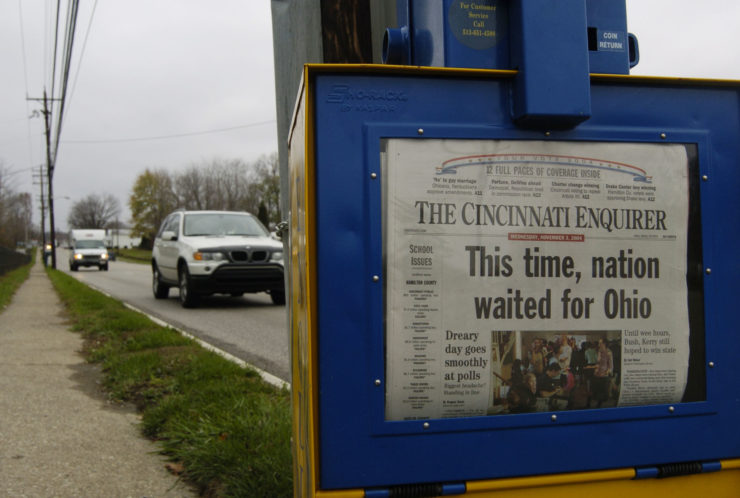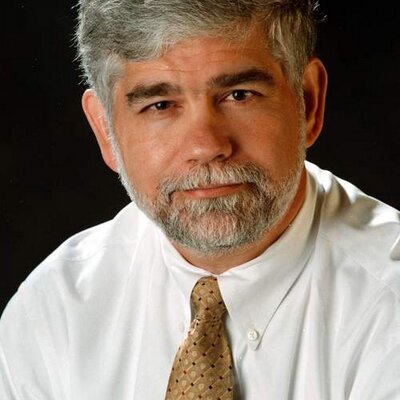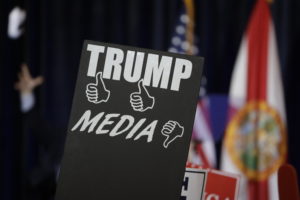
A copy of the Cincinnati Enquirer sits in a newspaper rack in Amelia, Ohio
In all the gnashing of teeth that has gone on in the wake of the new administration and its relentless attacks on the press, the term “transparency” has earned a new status in newsrooms. It isn’t a new concept, and it is something that media have talked about and worked on for many, many years. But in the era of President Trump it becomes more of an imperative as we work hard to restore trust lost in the last election cycle, regardless of how fair the charges against us may be.
Many have written, including me, that our journalism remains our most potent tool in rebuilding our credibility. We do have to be relentless in our pursuit of the best work, regardless of market, regardless of region, regardless of the size of our newspaper, site or station.
As a regular judge of contests and a part of the 109-site USA TODAY Network, I am in awe of the magnificent work being done around the country. It ranges from fabulous investigative work to tear-inducing narrative storytelling, and is anchored by great beat reporting and stunning digital visualizations. Being the eyes and ears of the public will never go out of style.
But we have to do more.
Some of it is simple and traditional.
- Editors need to write more columns focused on the internal operations of the newsroom. They need to explain how we do what we do. In detail. Don’t try to be funny or to outwrite our colleagues. Get to the nuts and bolts. If a column doesn’t work, make it a simple Q&A format (especially good for mobile). Demystify our process. Show how nonsensical the conspiracy theories are. And acknowledge our mistakes, big and small.
- When we publish projects or deeply reported work, we need to go in-depth in disclosing how we got the work done, the nuances of the reporting, the decisions we made.
Sure, this is common, too, but most such efforts tend to be fairly simple. Often it is a celebration of the reporters who did the work, or a statement of principles, such as not naming crime victims. It might be a restatement of practice; for example, not directly quoting a source in a reconstructive narrative if the reporter wasn’t on hand. It could be a note on how long the work took or a warning about potentially offensive language.
These are all good practices, but build from there. Talk about the details of interviews, the decisions made in the reporting and editing process, what we don’t know, and key moments in the work. Make it an essential part of the package, not an afterthought.
- Continue to push social media as a way to be visible to wider sections of the community in addition to promoting our content. Staffers should be seen and not just read and should be regulars on Facebook Live and video. “Engagement” isn’t just clever social headlines or a robust presence on the latest and greatest social media platform. We’ve become more intentional about when and how we communicate with readers in our community groups, comments sections and messages in order to address everything from customer service to coverage.
- Put out the word that the editor and other top editors are available for speeches and group meetings. I did so in a recent column. One interesting result is that I am speaking to a progressive change-seeking group and a Tea Party group (separately) in the weeks ahead. I’m also going to speak to a group that took it upon itself to measure column inches of our coverage in a fixed period during the campaign and declared it biased.
- Seek out people who have canceled the paper over perceptions of either favoring Clinton or opposing Trump and hear them out face-to-face. The point is to hear from their own mouths their frustration with our coverage and to get away from the nastiness of email.
- Stage more public events, whether they are coffees with readers/viewers, meetings with constituencies of various sorts, or more formal events. The Cincy Storytellers Project that originated at the Arizona Republic in Phoenix is in its third season, and thousands of individuals have attended our nine evenings of storytelling. Our most recent featured an outspoken city councilman, a neighborhood activist and social do-gooder, a defeated but humorous political candidate, a young woman who is staging spoken-word events in partnership with Black Lives Matter and a woman who quit catering events to start making food for the poor. Their personal stories transcended race, class and politics and were a powerful reminder of the importance of connecting communities.
- We are going to encourage our staff to write personal essays on life experiences they are willing to share. These will serve to help our audiences understand them as people as well as the personal passions that drove them to become journalists
The dilemma for those of us outside the Beltway and not on cable TV or in the national media is a little different. We always have had a more personal relationship with our readers. And those readers aren’t shy about lighting us up when they feel we have done wrong. I acknowledge we brought a firestorm on ourselves by endorsing Hillary Clinton, the first time in a century The Enquirer endorsed a Democrat. (I am asked regularly do I regret the decision our editorial board made. No, I don’t. But we all could have done without the vitriolic emails and cancellations of the paper.)
The news is local for us, but the accusations from the Oval Office tar us as well. In covering, for example, the impact of the immigration ban locally, we saw a mini-surge in cancellations that may have been related to some not taking kindly to coverage of refugees who didn’t arrive here.
Whatever our individual circumstances, we need to move forward and remind our communities of the vital and important work we do. None of the above is rocket science or hasn’t been thought of before. But being more transparent is an important tool in winning back any lost credibility.


